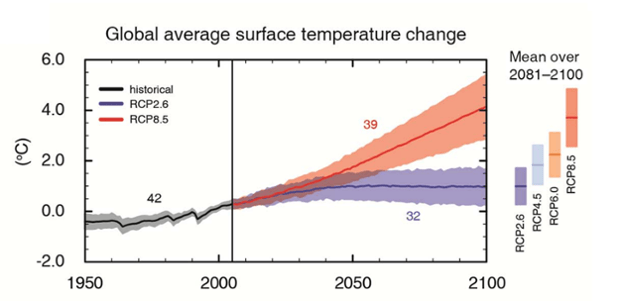 IPCC AR5 WGI Figure SPM.7: CMIP5 multi-model simulated time series from 1950 to 2100 for (a) change in global annual mean surface temperature relative to 1986–2005.
IPCC AR5 WGI Figure SPM.7: CMIP5 multi-model simulated time series from 1950 to 2100 for (a) change in global annual mean surface temperature relative to 1986–2005.Have you ever watched a zombie movie and wondered if the protagonists will grow physically tired from having to repeatedly kill zombies that inevitably rise once again from the dead? That’s how people often feel when confronted with climate change myths that were debunked years ago. These myths never seem to stay dead, inevitably being revived by climate contrarians no matter how conclusively and repeatedly they’ve been debunked.
And so we have writer Matt Ridley once again published in the London Times complaining, “Rather than attack my arguments, my critics like to attack my motives.” That’s undoubtedly because when an individual keeps repeating the same myths over and over again, people eventually grow tired of debunking those myths and naturally question the motives of the individual who keeps making them.
Let’s look at a few examples from Ridley’s latest article. He claims not to be worried about global warming for a few reasons, including,
The failure of the atmosphere to warm anywhere near as rapidly as predicted was a big reason: there has been less than half a degree of global warming in four decades - and it has slowed down, not speeded up.
This is incorrect – average global surface temperatures have warmed between 0.6 and 0.7°C over the past 40 years (lower atmospheric temperatures have also likely warmed more than 0.5°C, though the record hasn’t yet existed for 40 years). During that time, that temperature rise has temporarily both slowed down (during the 2000s, when there was a preponderance of La Niña events) and sped up (during the 1990s, when there was a preponderance of El Niño events). Climate models accurately predicted the long-term global warming trend. Ridley continues,
Sea level has risen but at a very slow rate - about a foot per century.
Given that sea level has risen faster than predicted, if you’re arguing against the dangers posed by global warming, sea level is a poor choice. Climate research projects a sea level rise in the ballpark of 1 meter (3 feet) by the year 2100 if we follow the business-as-usual path advocated by folks like Matt Ridley.
Also, I soon realised that all the mathematical models predicting rapid warming assume big amplifying feedbacks in the atmosphere, mainly from water vapour
Here Ridley is again quite wrong. We know that water vapour (as a greenhouse gas) will amplify global warming because a warmer atmosphere can hold more of it. Observations have confirmed this is exactly what’s happening in the real world. This isn’t an assumption of models – it’s based on scientists’ understanding of basic atmospheric physics.
Another thing that gave me pause was that I went back and looked at the history of past predictions of ecological apocalypse from my youth - population explosion, oil exhaustion, elephant extinction, rainforest loss, acid rain, the ozone layer, desertification, nuclear winter, the running out of resources, pandemics, falling sperm counts, cancerous pesticide pollution and so forth. There was a consistent pattern of exaggeration, followed by damp squibs: in not a single case was the problem as bad as had been widely predicted by leading scientists. That does not make every new prediction of apocalypse necessarily wrong, of course, but it should encourage scepticism.
At least Ridley admits that this is a poor excuse for dismissing the threats posed by climate change, but it’s a far poorer excuse than he realizes. The reason that the worst possible consequences from acid rain, ozone depletion, pesticide pollution, and so forth weren’t realized is that we took action to mitigate those threats. Specifically, we put a price on the pollutants that caused acid rain and ozone depletion, and regulated pesticide use. Those are precisely the solutions proposed to mitigate global warming. Ridley makes a similar error when discussing IPCC global warming projections,
My best guess would be about one degree of warming during this century, which is well within the IPCC’s range of possible outcomes.
A further 1°C global warming by 2100 is only a possibility in one of the scenarios considered by IPCC (called RCP3-PD, where ‘PD’ stands for a rapid peak and decline of carbon emissions).
 IPCC AR5 WGI Figure SPM.7: CMIP5 multi-model simulated time series from 1950 to 2100 for (a) change in global annual mean surface temperature relative to 1986–2005.
IPCC AR5 WGI Figure SPM.7: CMIP5 multi-model simulated time series from 1950 to 2100 for (a) change in global annual mean surface temperature relative to 1986–2005.
It’s the scenario in which there is an immediate and aggressive global effort to cut carbon pollution. Specifically, human global carbon emissions peak in 2020, after which they decline at a rate of around 3.5% per year, reaching zero in 2070 and continuing to fall as we remove carbon pollution from the atmosphere.
Matt Ridley opposes immediate aggressive efforts to cut global carbon pollution. It’s disingenuous at best for him to argue that his beliefs about modest global warming are consistent with the IPCC projections whilst advocating against the relevant pathway. It’s like arguing, “My belief that I can lose weight while eating lots of cake and ice cream is well within medical doctors’ range of my possible health outcomes.”
There are numerous other errors and zombie myths in Ridley’s piece that I won’t go into. For example, he revives long-debunked myths about the ‘hockey stick’ and ‘Climategate.’ Worst of all is the conclusion to which Ridley’s flawed arguments lead – that we needn’t take serious action to mitigate global warming because he doesn’t believe climate consequences will be serious.
Posted by dana1981 on Wednesday, 21 January, 2015
 |
The Skeptical Science website by Skeptical Science is licensed under a Creative Commons Attribution 3.0 Unported License. |